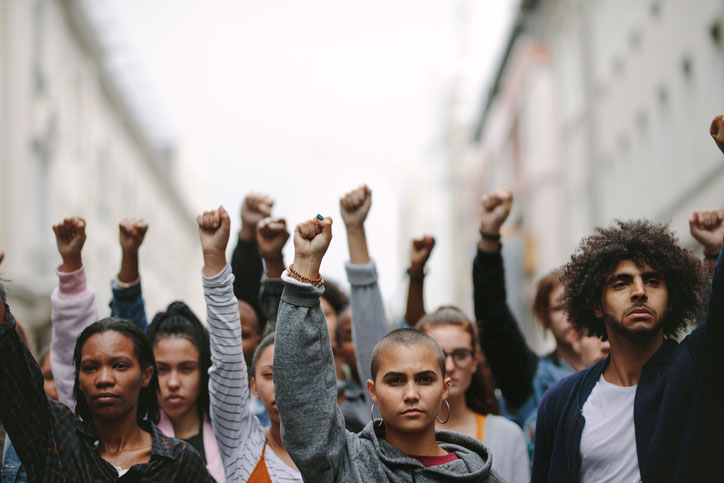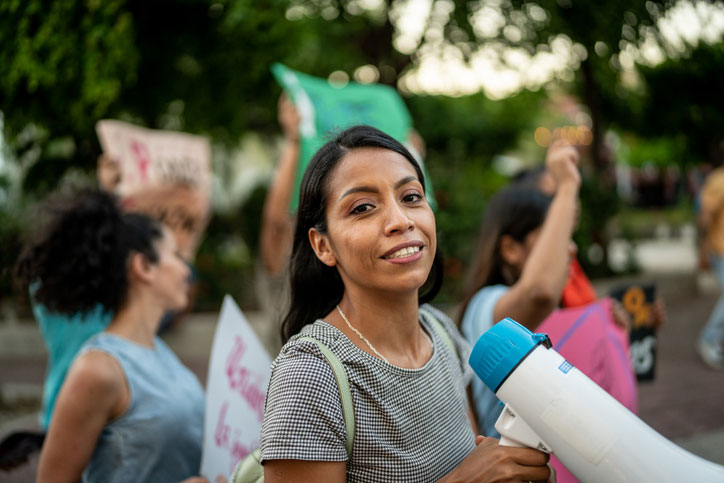Written by Scott Wilson

At the epicenter of global commerce and diplomacy, New York sits at an important inflection point for efforts to make a more just, more equitable, and more peaceful planet. It’s a state and a city where policy and protest both make the world sit up and take notice.
There’s a reason that organizations like the Ford Foundation Center for Social Justice make their homes in New York.
In 1964, one of the largest demonstrations of the civil rights movement found its epicenter right here. On February 3rd, students and teachers alike walked out of New York City public schools and took to the streets, some 500,000 strong, to protest against de facto segregation in an event that came to be known as Freedom Day. The March on Washington the year before, anchored by Dr. Martin Luther King Junior’s famous “I Have a Dream” speech, mustered only around half as many participants.
Like many social justice protests, the Freedom Day school boycott failed to achieve its immediate aims. Yet it’s also credited with helping lock in Northern voices in support of the landmark Civil Rights Act of 1964, which finally passed through the Senate a mere five months later.
That’s the kind of weight New York carries on the national scale. And it’s why social workers interested in social and economic justice and peace both nationally and worldwide flock here to change the future for the better.
How New York’s Social Workers are Contributing to Social Justice Movements
Social workers in this role work to provide support and promote empowerment among marginalized communities. Traditionally, they do this by any means necessary: organizing demonstrations, conducting sit-ins, filing petitions, lobbying for legislation, buttonholing politicians in elevators and on the streets.
Social justice is a field where that brassy New York willingness to let people have a piece of your mind comes in handy.
As exciting and impactful as that work can be, however, most of the role of social justice social workers comes down to a lot of hard work that shows results only very slowly. It’s about:
- Observing and researching areas of social injustice and inequity
- Building grassroots mobilization and community development programs to garner support for change
- Conducting public awareness and outreach campaigns to build popular support
- Working with stakeholders to craft compromises
- Fundraising and lining up resources to support their efforts
It’s challenging in the extreme to push social justice movements forward to a point of real action. But it’s also one of the most effective forms of social work. Any social worker can make a difference for an individual experiencing disease, poverty, or homelessness. But a social worker who creates a groundswell of change in society can make a difference for millions.
Social Workers Are in a Unique Position to Push Social Justice Movements Forward
Social justice advocacy is hard work. A quick glance at history shows you how overwhelming baked-in systemic and cultural discrimination can be.
One of the main aspects of social work that makes it uniquely suited to addressing all kinds of inequity and societal issues is that it doesn’t shy away from calling out the root causes of poverty.
Sure, all kinds of other human services professions deal with many of the same kinds of issues as social workers…
- Unhoused individuals and families
- Domestic violence and child abuse
- Substance use disorders
- Elder care and support
- Healthcare and mental health
But while a psychologist or nurse can sit down with an individual patient and deal with their immediate mental or physical ailments, and a substance abuse counselor can help someone fight the scourge of addiction, only a social worker has the training, inclination, and ability to look at the wider social perspective on why those patients are suffering in the first place.
Unlike many kinds of social work roles in New York, this kind of advocacy and macro systems work doesn’t necessarily require licensure as an LMSW (Licensed Master Social Worker) or LCSW (Licensed Clinical Social Worker). But to be effective in this work, you will still need serious qualifications.
The Best Social Work Degrees in New York for Social and Economic Justice Roles

Social and economic justice is a broad concept that can draw on almost any of the specializations that are common in social work degree programs.
Licensing is not a requirement for these roles in New York, so a master’s degree isn’t an absolute must. But with the high bar for expertise in the field, it’s still most common to prepare for this work with a Master of Social Work. The kind of expertise and deep understanding of political processes it takes to make a real impact in social justice efforts is best developed through graduate-level studies.
That’s true regardless of the area of focus you choose. So specializations in areas like healthcare, gerontology, or child and family services can lead you into high level advocacy and policy work in those fields.
But there are also MSW concentrations that help you understand the organizational and policy levers that you will be pulling in social justice and equity movements. In New York, you’ll find those in the form of degrees like:
- Master of Social Work in Policy Practice and Advocacy
- Master of Social Work in Organizations and Community
- Master of Social Work in Leadership Management and Entrepreneurship for Social Justice
- Master of Social Work in Contemporary Social Issues
- Master of Social Work in Community Organizing
- Master of Social Work concentration in Organizational Management and Leadership
Coursework in these programs leans toward holistic approaches to handling major issues in society. They will teach organizational and practical political skills on top of the standard fare of ethics and social systems. You can expect to encounter classes such as:
- Human Behavior in the Social Environment
- Financial and Resources Considerations
- Principles of Community Organizing
- Grant Writing
- Political Advocacy and Social Movements
- Fundraising and Marketing
- HR Management in Social Services
Frequently, these degrees include elective options or full concentrations that zero in on specific policy areas you might want to address, such as mental health or economic justice.
You’ll notice that many of these classes take on a tint of management and leadership training on top of social justice and equity considerations. That’s because effecting change in social justice means being a leader, and organizing masses to support that change.
That means that huddling in a back room and cranking out policy papers isn’t the path to a lengthy and effective career in social justice. These programs prepare you for frontline work in the offices of major nonprofits or Fortune 500 corporations, and in the halls of power in Albany, New York City Hall, or even the United Nations.
The kind of polish and command of facts and resources required to be effective in those places are what you earn in these degree programs.
Professional Certifications Available for New York Social Workers Specializing in Social and Economic Justice
Professional certifications are a high-level, third-party recognition of your skills and abilities in your chosen field of social work. Primarily offered for social workers through the National Association of Social Work (NASW), these most commonly line up with the sort of practice areas most social workers gravitate to:
- Gerontology
- Case Management
- Substance Use Disorder Counseling
- Healthcare
- Mental Health and Clinical Treatment
But there is one unique certification offered by NASW that speaks to skills and abilities in leadership: the Academy of Certified Social Workers certification.
The ACSW is one of the oldest and remains one of the most highly respected certifications in social work both nationally and internationally. It is only available to social workers who:
- Are current NASW members
- Hold a master’s degree in social work from a CSWE-accredited program
- Have at least two years of postgraduate employment in social work while supervised by an MSW-credential supervisor
- Provide at least three independent professional evaluations of their social work principles and values from a supervisor and two colleagues
- Complete 20 verified hours of relevant continuing education
- Adhere to the strict NASW Code of Ethics and continuing education standards
This is professional recognition of your social justice and equity credentials coming from the national level. It’s something that both your community and colleagues will be sure to take seriously.
Jobs in New York for Social Workers in Social and Economic Justice & Peace

New York is a Mecca for social workers with big picture social and economic justice concerns. With many big international aid organizations, equity-minded non-profits, and intergovernmental agencies based in New York, jobs are always coming up in this field.
You have the full span of different organizations that hire for these roles here. Groups that are dialed into housing justice and rent control advocacy may have tiny, bustling offices in Greenwich Village… major national and international organizations like Doctors Without Borders, Action Against Hunger, or Plan International have hundreds of employees and multi-million dollar budgets.
UNICEF and other government-sponsored charities and aid societies are also common throughout New York. Many of them hire social workers with strong social and economic justice qualifications.
There is plenty of room for independent and entrepreneurial advocacy efforts here, too. If there’s a cause you see that isn’t being served well by existing efforts or organizations, you can bootstrap your own social justice startup. You may have heard of one such independent program called the Millennium Promise Alliance, which raises funds from major donors like Tommy Hilfiger with the goal of eradicating poverty and malaria in Africa in our lifetime.
Thinking big is no vice when it comes to social justice. With a graduate degree that expands your mind and your skills, you can take big ideas and turn them into real change for real people. There’s not a moment to lose.
